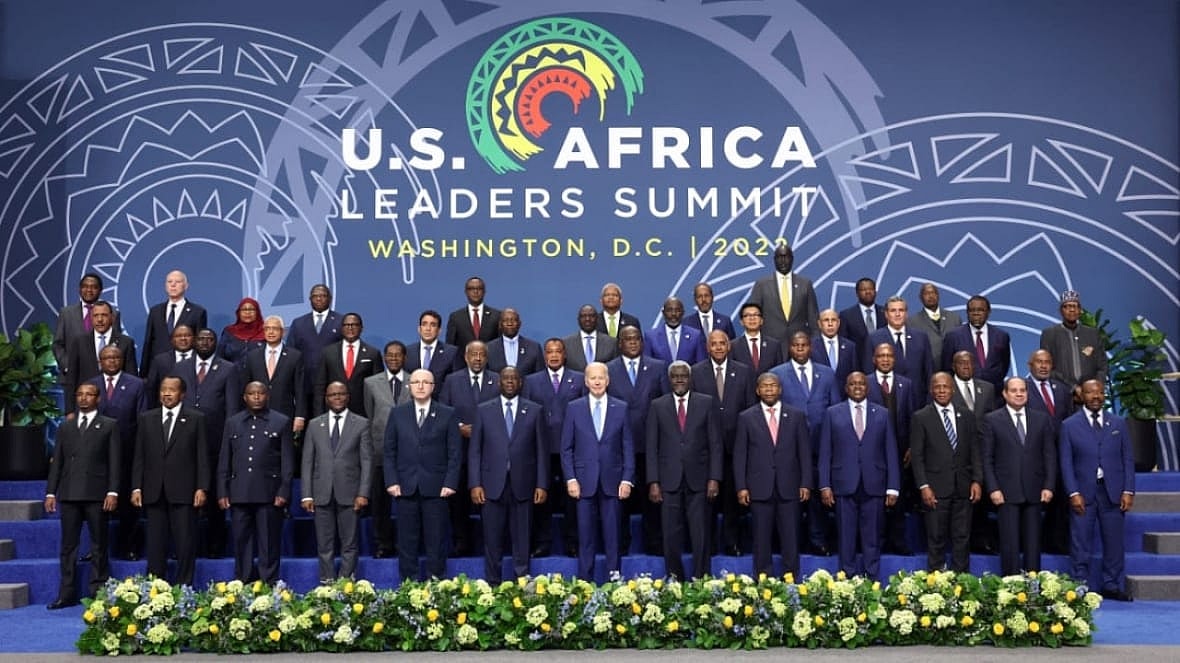Vice President Kamala Harris’ trip to the Bahamas marked a significant step in the United States’ relationship with the Caribbean as it was both historic and consequential.
“She is the highest-ranking White House official to visit the Caribbean nation since John F. Kennedy in 1962,” said a White House senior official during a press call on background for Harris’ daylong trip Thursday.

The vice president’s visit, which included a meeting with Caribbean leaders, was accompanied by a string of announcements from the Biden-Harris administration, including more than $100 million in new assistance for the region for needs like getting access to banking and combating the climate crisis.
The financial commitments are in direct response to needs communicated by Caribbean leaders to the U.S. in previous meetings hosted by Harris over the past year.
“Strengthening the U.S.-Caribbean relationship is a priority for me, as it is for President Joe Biden,” said Harris, who is of Jamaican descent, during Thursday’s U.S.-Caribbean Leaders Meeting, co-hosted by Bahamas Prime Minister Philip Davis.
The Biden-Harris administration used Harris’ historic trip to announce $20 million toward the Caribbean Climate Investment Program to “incentivize” the private sector to develop clean energy technologies in the region. Additionally, the White House issued $15 million to support and strengthen emergency response efforts by the Caribbean Disaster Emergency Management Agency.
The vice president announced she is also working with the World Bank to help Caribbean nations get more access to increased banking services, including low-cost concessional financing. Harris met with the World Bank’s new president, Ajay Banga, this week and helped coordinate his virtual attendance at Thursday’s meeting with Caribbean leaders.

Several other major announcements were made, such as the United States officially declaring its support of a multinational force to address the crisis in Haiti, the future establishment of two embassies in the Eastern Caribbean, along with an expanded diplomatic presence in the region, and a new role within the Department of Justice to tackle the trafficking of firearms to the Caribbean.
“We are neighbors in the Western Hemisphere,” said Harris, “and the security and prosperity of this region requires the type of collaboration and partnership that we have developed and continued to grow.”
U.S. Congresswoman Stacey Plaskett, a delegate representing the U.S. Virgin Islands, applauded the vice president’s trip to the Bahamas as a “really important” demonstration that the United States is going to “further the designation that [President] George W. Bush made that the Caribbean is the United States’ third border.”
Plaskett said as the 50th anniversary of the intergovernmental organization, the Caribbean Community (CARICOM), nears in July, she would also like to see the administration and members of Congress have a presence in Trinidad to “show support for the issues that are important in the Caribbean region,” including climate, transportation, broadband and energy.
While the benefits for the Caribbean are clear, the congresswoman also noted the “great potential” for the U.S. as well.

“The Caribbean region, outside of oil and gas … are the fifth-largest importer of American goods,” noted Plaskett. “Because so few goods are actually created in those nations and having them rely on the United States than other players would significantly support us.”
She said her office and members of the House Caribbean Caucus — such as Rep. Yvette Clarke (D-N.Y.), Rep. Maxine Waters (D-Calif.), Rep. Sheila Cherfilus-McCormick (D-Fla.) and Rep. Steven Horsford (D-Nev.) — are “trying to find ways in which we can show the benefits of the United States engagement in the region.”
Last week, Plaskett introduced the DiasporaLink Act, which would request an assessment of the value, cost and feasibility of developing a trans-Atlantic submarine fiber optic cable that would provide high-speed internet connection to Africa and throughout the Caribbean from American soil.
“It’s going to provide not just national security for us in the United States and Africa, in terms of security, but economically as well,” said Plaskett. “Having direct links with the United States is going to really boost digital engagement … [especially] digital nomads, who are looking for new homes and new places to have their businesses.”
The objective is also to connect the Black diaspora. “We’re looking to that as a means of also growing the economies of Africa and making a means for African Americans, people of the African diaspora, to be much more engaged as well,” Plaskett said.
Joseph Tolton, a Pan-African advocate, told theGrio that he sees Harris’ trip to the Bahamas and the White House’s reengagement in the Caribbean as a “signal that the administration wants to have an approach with nations of the global south and Black-led nations that are guided by a sense of equity and mutual respect.”

Tolton, who is the executive director of Interconnected Justice, says the Biden-Harris administration’s announcements on Thursday showed that it takes seriously its relationship with CARICOM.
“Biden really wants to lead, I think, a new, nuanced world order with a clear alignment of nations and regions that are assembled based on our common values and commitments to democracy, open markets and human rights,” he said.
The announcements around providing support for Haiti amid economic and political instability were especially noteworthy to Tolton, who described it as “huge” and “desperately needed.”
Harris’ pronouncement that the U.S. supports a multinational force to intervene in the poor Caribbean nation is something that Prime Minister Ariel Henry has been asking for.
“The multinational force is really important because it should not be the U.S. alone, as kind of an imperial power going in,” said Tolton. “It would be great to have some Black republics or Black nations, or even the [African Union] peacekeeping forces, as a part of this as well.”

Gerren Keith Gaynor is a White House Correspondent and the Managing Editor of Politics at theGrio. He is based in Washington, D.C.
TheGrio is FREE on your TV via Apple TV, Amazon Fire, Roku and Android TV. Also, please download theGrio mobile apps today!

